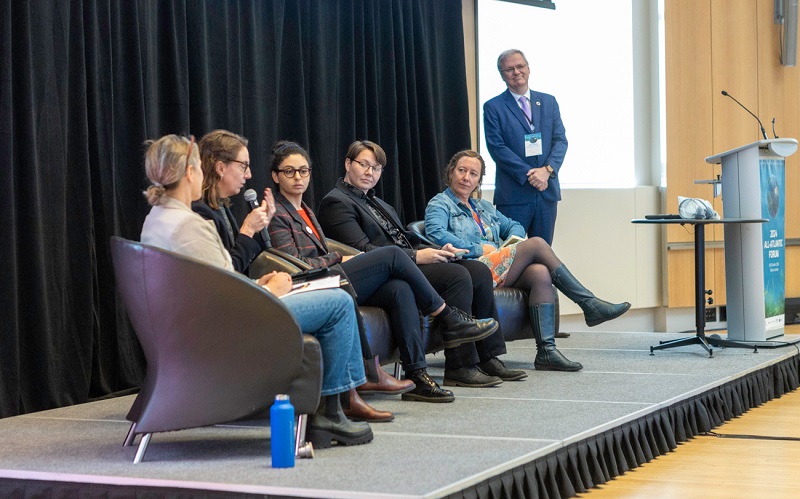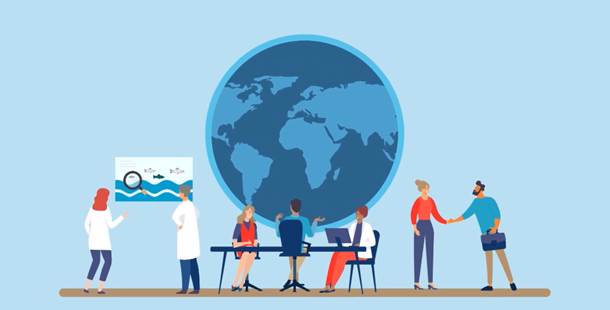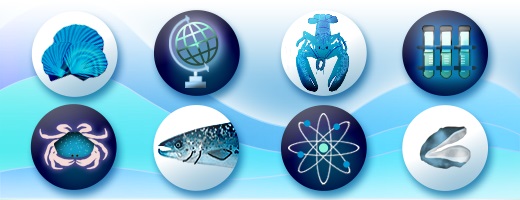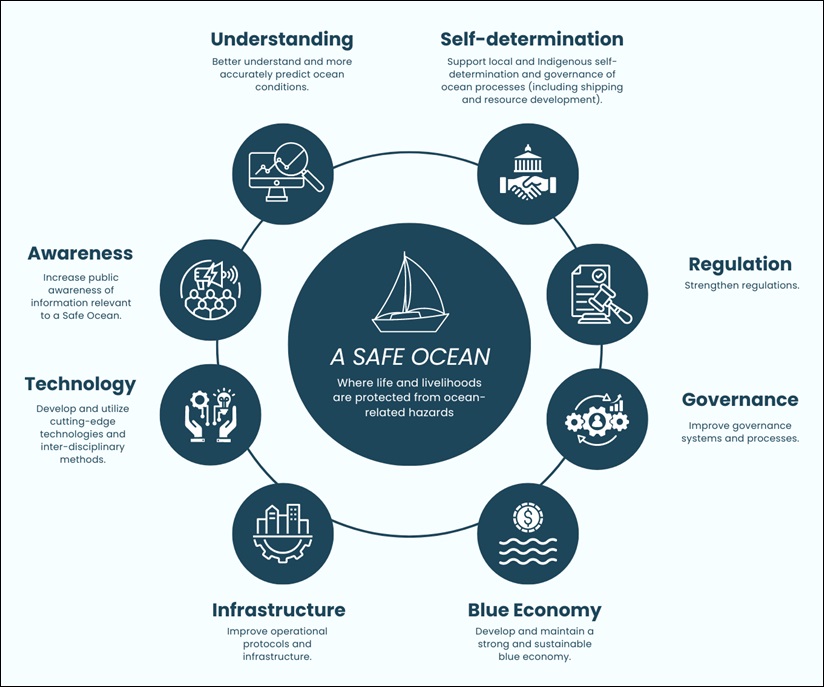ORCA presents: Canada's Ocean Decade newsletter
November 2024 – Issue 13

On this page
- Ocean Decade Vision 2030 White Papers
- The 8th Call for Decade Action is now open
- Canada hosts the 2024 All-Atlantic Ocean Research and Innovation Alliance (AAORIA) Annual Forum
- Get ready to co-design transformative actions for sustainable development
- A registry for external science experts to support the science advice at Fisheries and Oceans Canada
- Measuring the impacts of ocean literacy
- Plan to move toward a Safe Ocean in Canada within the Ocean Decade
- Upcoming events
- Contact us
Ocean Decade Vision 2030 White Papers
In June 2024, the Intergovernmental Oceanographic Commission of UNESCO published a series of 10 Vision 2030 White Papers, one per Ocean Decade Challenge, that explore what is needed to meet these challenges by the end of the Decade and beyond. These papers are the result of a joint effort involving more than 150 experts from around the world, including many Canadian scientists and organizations, that explore users’ needs and identify scientific knowledge gaps, as well as make strategic recommendations on the resources, infrastructure, partnerships, capacity development, and technology solutions required to address them.
For more information on the 10 Vision 2030 White Papers, and to read them, please see the UNESCO Website.
The 8th Call for Ocean Decade Action is now open
The IOC-UNESCO launched the 8th Call for Ocean Decade Actions on October 15th. You have until January 31st, 2025 to submit your transformative new initiatives and contributions for Ocean Decade endorsement. This call is looking for new projects aligning with existing Ocean Decade Programs and brand new programs focused on bridging science and knowledge gaps in coastal resilience, society’s relationship with the ocean, and the ocean-human health nexus. To access all the details and submit your initiative, you will need to be a member of the Ocean Decade Network. You are encouraged to join the Network as soon as possible!
Contact DFO’s Ocean Decade Office at DFO.OceanDecade-DecennieOcean.MPO@dfo-mpo.gc.ca for any questions or to receive support with the application process.
Canada hosts the 2024 All-Atlantic Ocean Research and Innovation Alliance (AAORIA) Annual Forum
Canada hosted the All-Atlantic Ocean Research and Innovation Alliance (AAORIA) Annual Forum in Ottawa, Canada on October 8-10, 2024, with nearly 160 people from 20 countries participating in person and over 400 people following online. Programming emphasized the current AAORIA Areas of Action (i.e., climate science and coastal resilience, and ocean observation and modelling) and highlighted a continued commitment to ocean literacy and the achievement of diversity, equity, and inclusion (DEI) in ocean science. Led by Ingenium – Canada’s Science and Innovation Museum and Fisheries and Oceans Canada, AAORIA produced a series of digital posters to inspire youth and promote the importance of diversity in ocean science. Strong linkages to the Ocean Decade were made throughout the 2024 Forum, including a side event hosted by the Intergovernmental Oceanographic Commission (IOC-UNESCO) focused on regional coordination and the leveraging of efforts to maximize Atlantic Basin-level impacts. Side events were also hosted by Canadian organizations (i.e., the Canadian Ocean Literacy Coalition, Marine Environmental Observation, Prediction, and Response Network (MEOPAR), Ocean Frontier Institute) to highlight their work and encourage opportunities for cooperation with international partners. Please visit, the Summary of Outcomes from the 2024 All-Atlantic Forum.
As part of the 2024 All-Atlantic Forum, the AAORIA Ocean Observation and Modeling Work Plan was endorsed and experts are being sought to contribute to these efforts. Experts will participate in working groups that will develop a more detailed proposal for each action, including proposed outputs, timelines, and required resources. If you are interested in being nominated as an expert, please communicate your interest no later than 10 November 2024 by sending an email to DFO.EOS2024AtlanticForum-2024ForumAtlantiqueSEO.MPO@dfo-mpo.gc.ca with your name, organization, your expertise, and the expert group(s) you are interested in.

Get ready to co-design transformative actions for sustainable development
The Ocean Decade Capacity Development Facility, in collaboration with the Ocean Teacher Global Academy of the International Oceanographic Data and Information Exchange of Intergovernmental Oceanographic Commission of UNESCO (IOC/IODE) Project Office and the Leibniz Centre for Tropical Marine Research (ZMT) launched a new self-paced free online training on co-design to develop and implement transformative action into the Ocean Decade. The training explores the co-design concepts, objectives, and methodology essentials to better equip participants with the skills needed to advance science for a sustainable ocean.
For more details about the course and registration, please see visit OceanExpert.

A registry for external science experts to support the science advice at Fisheries and Oceans Canada
Fisheries and Oceans Canada undertakes scientific peer review and provides science advice related to the department’s mandate through the Canadian Science Advisory Secretariat (CSAS). To achieve this, expert review, critical evaluation and challenge of the scientific information and analyses for the development of science advice are conducted. CSAS peer-review processes seek to produce science advice for decision-making that is evidence-based, objective and impartial.
To ensure a broader range of expertise for peer-review meetings, CSAS has launched the Registry for External Science Experts (RESE).The RESE is a database that serves as a repository of external experts who self-identify as being willing to participate in CSAS processes. The registry will aid in the selection of experts for participation in the CSAS peer-review process. Individuals who are interested in self-identifying as experts can do so.
For more information on the roles and responsibilities of peer reviewers please reference the Participant’s Guide to Peer Review Meetings. Should you have any questions and/or would like more information, please do not hesitate to reach out to the RESE email address.

Measuring the impacts of ocean literacy
The Canadian Ocean Literacy Coalition (COLC) is dedicated to empowering Canadians to better understand, value, and care for the ocean. Our annual National Strategy Impact Reports are crucial to this mission, measuring the efficacy of our efforts and ensuring that our work leads to a more ocean-connected society. By tracking progress, we adapt and improve our approaches to key initiatives, making evidence-informed decisions about resources, capacity, and partnerships.
As outlined in the 2023 Impact Report, COLC's initiatives, such as Ocean Week Canada, engaged over 6 million people, supported 639 partnerships, and produced 92 new ocean literacy resources. Beyond the numbers, the report reflects how communities across Canada are engaging with the ocean in meaningful ways. Our impact measurement program supports a vital, ongoing national dialogue about the ocean’s role in our lives, inspiring action to protect the ocean and freshwater in Canada.
For more details about our work, visit Canadian Ocean Literacy Coalition.
Plan to move toward a Safe Ocean in Canada within the Ocean Decade
A Strategic Science Plan for one of the Decade Outcome ‘A Safe Ocean- where life and livelihoods are protected from ocean-related hazards’, has been developed to establish a clear vision for what can be achieved in Canada during the remaining of the Ocean Decade. Dr. Jackie Dawson, member of the Canadian Ocean Decade Community of Champions, and her team developed 64 research priorities and 17 vision statements using a three-phased iterative approach involving a workshop and two surveys of experts and rights holders relating to the Ocean Decade Safe Oceans outcome in Canada.
The vision statements were categorized into 8 themes (see figure below), along with 3 additional priorities achievable in the long term.
You are invited to look at the detailed results in the technical report and the Strategic Science Plan.

Description
A safe ocean
Where life and livelihoods are protected from ocean-related hazards
- Understanding
- Better understand and more accurately predict ocean conditions
- Self-determination
- Support local and Indigenous self-determination and governance of ocean processes (include shipping and resource development)
- Regulation
- Strengthen regulations
- Governance
- Improve governance systems and processes
- Blue Economy
- Develop and maintain a strong and sustainable blue economy
- Infrastructure
- Improve operational protocols and infrastructure
- Technology
- Develop and utilize cutting-edge technologies and inter-disciplinary methods
- Awareness
- Increase public awareness of information relevant to a Safe Ocean
Upcoming events
- November 6-7, 2024- Atlantic Canada Fish Farmers Association’s (ACFFA) 2024 Aquaculture Research, Science and Technology Forum (St. Andrews, NB)
- November 9-15, 2024 – 25th Biennial Conference on the Biology of Marine Mammals (SMM2024) (Perth, Australia)
- November 18-22, 2024- OceanPredict Symposium 2024-OP’24 (Paris, France)
- November 20-22, 2024- Canadian Science Policy Conference (Ottawa, ON)
- December 9-12, 2024 – ArcticNet Annual Scientific Meeting (Ottawa, ON)
Contact us
Together, we can advance our collective understanding of the ocean!
Email us for more information or to subscribe to this newsletter.
Email: DFO.OceanDecade-DecennieOcean.MPO@dfo-mpo.gc.ca
Website: United Nations Decade of Ocean Science for Sustainable Development (2021-2030)

Email: ORCA.AROC@dfo-mpo.gc.ca
Website: Oceans Research in Canada Alliance
Twitter: @CanOceanSci
LinkedIn: @CanOceanSci

- Date modified: